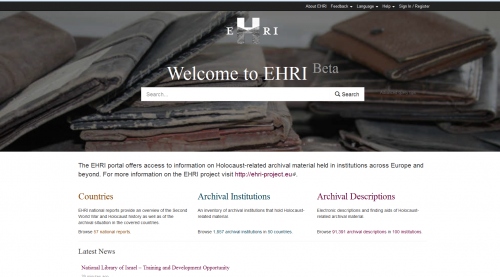The EHRI Portal: a Final Spurt.

One of the most important outcomes of the EHRI project will be an online portal offering researchers and the interested public access to in-depth information on Holocaust related archives and documentation. The EHRI portal is the culmination of much of the research undertaken in EHRI, and after almost four years of intense work, it is now in the final stages of development. Reto Speck (KCL and NIOD) is co-ordinating the development of the EHRI portal; here he provides an overview of its aims and progress.
Access to information and tools
The aims of the EHRI portal go right to the heart of the EHRI project as a whole. Because Holocaust sources are highly fragmented and widely dispersed across Europe and beyond, a virtual unification of information about such sources will be of great benefit to Holocaust researchers. The portal will host an impressive array of information including national reports that give a concise overview of the Holocaust history and the archival situation in 42 countries; details of more than 1,700 archives that hold Holocaust-related sources; and descriptions of thousands of archival units lodged in repositories across Europe and beyond. In addition, the portal will host a number of virtual research guides about particular themes such as the Ghetto in Theresienstadt. Once the EHRI portal opens in March 2015 all this information can be accessed online by anyone with an interest in the Holocaust.
Of course researchers need tools to explore and analyse the available information. The portal hosts a powerful search engine that integrates a specifically designed multi-lingual thesaurus, thereby enabling retrieval of information across different languages. Apart from conducting pinpoint searches, researchers can also explore the totality of the portal's content via a browsing interface, and iteratively narrow results sets by using pre-defined facets. Relevant information can be bookmarked and organised in a personal workspace.
Foster collaboration
Enabling researchers to find and organise information is only one aspect of the portal's toolset. The EHRI portal will also be social space where people with similar interests can meet, exchange knowledge and collaborate. For instance, all the information available in the portal can be annotated by registered users. By default such annotations are private to the author, but upon request and after moderation, they can be made available to the public. Annotations will thereby not only foster collaborations between archivists and researchers, but can also help researchers with interest in similar source material to meet and exchange expertise. It is one of the features of the portal that should help to make Holocaust research an even more collaborative endeavour than it already is.
Support new research on the Holocaust
The portal is a very significant outcome of the EHRI project, but it is not an end in itself. It can only be considered a success if it enables and supports new research on the Holocaust. We are confident that it will reach this end. The quantity and quality of the information that is accessible via the portal will make comparative and trans-national research on the Holocaust more convenient in the future, and its tools should give an impetus to collaborative approaches to historical research. Last, but not least, throughout the project we have successfully gathered the requirements of active Holocaust researchers for the portal, and have designed and developed it in such a way that it will meet the needs of its intended users.
A final spurt
Building the portal has been a big collaborative effort, bringing together many of the EHRI partner institutions, and experts from all the disciplines EHRI is built upon: history, archival science and digital humanities. Now we are in the last stage of the development phase where all previous activities and results need to be integrated, fine-tuned and tested. While much still needs to be done, we are well on our way to launch the portal for public use on 26 March 2015 during EHRI's final event in Berlin.
Image: Screenshot of the EHRI portal under development
